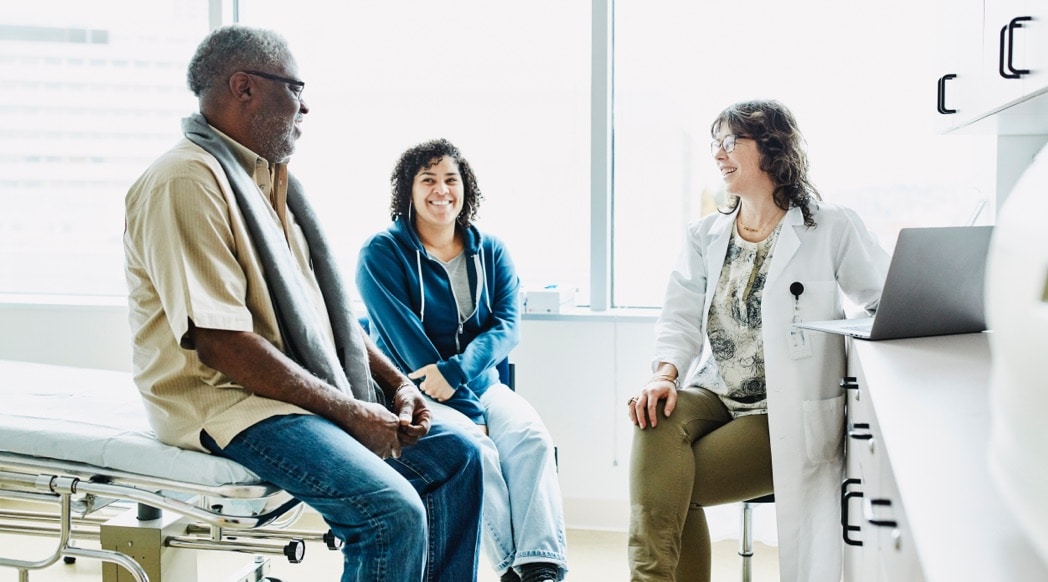We don’t just treat cancer. We treat you.
ECU Health has assembled a wealth of resources to support you and your family during your cancer journey. It’s our mission-minded commitment to your health and well-being. If you or a loved one is facing cancer, explore these resources to help along the way.
We are with you every step of the way. As an ECU Health patient, you and your loved ones have a unique benefit of comprehensive and individualized support throughout your journey here.
Explore the thousands of topics found in our health library to inform your health status, treatment options and return to life beyond cancer.
Resources for Family & Friends
When a friend or family member is diagnosed with cancer, you may find yourself in the role of caregiver. While your bond with your loved one may deepen, it also means changes for your life. Here are some practical tips and useful information to help you cope with what lies ahead.
Caregiving

You may be helping with day-to-day activities — accompanying your loved one to doctor visits, preparing food, or assisting with personal care, personal business and more. With time, you may become increasingly involved in important health care decisions. And you will likely be lending emotional support all along the way.
Be sure, though, to recognize your own needs. Take physical breaks and rest from caregiving tasks. Remember to address your own emotional needs — the fears and sadness you experience because of your loved one’s illness.
Seek answers from providers to questions you may have, such as:
- What symptoms do you need to know about right away, and which ones can wait?
- How do we reach you after office hours?
- What are common side effects of treatment? How can we manage them?
- What activities (personal, work, etc.) should my loved one be able to continue, and what should be limited or stopped for now?
Medical Issues

As caregiver, be sure to obtain the patient’s consent to talk with his or her medical team. Talk to his or her doctor about ways to ensure communications with you. If your loved one signs a release form, keep a copy and provide it for the patient’s record.
You can learn important information by going to physician visits with the patient. Be sure to share any new symptoms, ask your questions, and receive information on medications. Consider starting a notebook to use at each appointment and treatment. Make detailed notes on the cancer type and stage, recommended treatment plan, and medications (name, dose, purpose, etc.)
Legal Issues

Legal matters are sometimes the most uncomfortable to discuss but are critical to the path forward. Plan to have these discussions early in the journey to make sure decisions clearly reflect your loved one’s wishes.
The two most important considerations are who will manage the patient’s money and who will make health care decisions if he or she is unable to do so. At that time, it is very helpful to have surrogate decision-making tools in place.
A durable power of attorney allows a person chosen by the patient to make financial decisions on his or her behalf. It is strictly for financial and business matters, not for health care decisions. Sometimes, the caregiver who is primarily responsible for medical issues prefers to have their loved one choose a different person to handle financial matters.
A durable power of attorney for health care designates someone to make health care decisions if the patient becomes unable to do so. It is usually a close family member or friend and should be someone who completely understands the patient’s condition and wishes. The designee will be expected to honor those wishes regardless of his or her personal preferences.
When a person is diagnosed with a potentially terminal illness, certain matters are important to consider and make decisions about. Examples include: the right to refuse treatment, documents like advance directives and living wills, palliative care and organ donation. There are many online resources to help you with these sensitive issues, and you may wish to consult an attorney to help guide you and your loved one.
Risk Assessments

We believe in the power of early. Early detection and awareness of your risks for illness can make tremendous differences in the success of treatment. ECU Health Cancer Care provides online risk assessments for several types of cancer, including breast, cervical, colorectal, lung and ovarian cancers.
Frequently Asked Questions
Cancer Basics
Cancer is a disease in which abnormal cells divide and grow out of control. Cancer cells can invade other tissues and spread across the body.
About half of all men and one-third of all women in the United States will develop cancer at some point in their lifetime. The risk increases with age; about 77 percent of all cancer is diagnosed in people age 55 and older. Cancer occurs in people of all racial and ethnic groups.
All cancer begins in cells. Normal cells grow, divide to make new cells and then die. Cancer starts when cells in part of the body start to grow out of control. Instead of dying, cancer cells continue to grow and form abnormal cells. These extra, damaged cells often form a mass of tissue called a tumor. It is important to remember that not all tumors are cancerous. In other cases, such as leukemia, the cells don’t form tumors but attack the blood and blood-forming organs and spread through other tissues.
There are more than 100 different types of cancer. The main categories of cancer include:
- Carcinoma – cancer that begins in the skin or internal organs
- Sarcoma – cancer that begins in bone, cartilage, muscle, blood vessels or other connective or supportive tissue
- Leukemia – cancer that starts in blood-forming tissue such as bone marrow
- Lymphoma – cancer that begins in the cells of the immune system
- Central nervous system cancers – cancer that begins in the tissues of the brain and spinal cord
Cancer is not contagious. You cannot “catch” it from someone who has it. In fact, cancer patients need the support of family and friends, so don’t be afraid to visit and provide care to them.
Cancer is diagnosed frequently enough that many families have at least a few members who have had the disease. Certain types of cancer do seem to be linked to genes that run in families, but only a small portion – about 5 percent to 10 percent – of all cancers are believed to be inherited.
Cancer Prevention & Detection
The risk of developing many cancers can be reduced by making healthy lifestyle choices. For example, avoiding tobacco, limiting sun exposure and alcohol consumption, eating healthy foods and being physically active are all ways to decrease your risk.
Cancer screening tests are important to help find cancer early, before it has spread and is most likely to respond to treatment. The American Cancer Society recommends these screening guidelines for most adults. Check with your doctor to see what he or she thinks is best.
If a patient is showing possible symptoms of cancer, their doctor will order more tests, such as x-rays, blood tests or a biopsy.
Signs & Symptoms of Cancer
Sometime cancer will not cause any symptoms, especially early on. And even if you are exhibiting some of the symptoms below, remember that it does not mean that you have cancer. Many other conditions can cause the same signs and symptoms. General signs and symptoms of cancer:
- Unexplained weight loss
- Fever
- Fatigue
- Pain
- Skin changes
- Change in bowel or bladder habits
- Sores that do not heal
- Unusual bleeding or discharge
- Thickening or lump in breast or other parts of the body
- Chronic indigestion or trouble swallowing
- Nagging cough or hoarseness
Unusual signs and symptoms can indicate that something is not quite right in the body and should be evaluated by a doctor. If these symptoms are in fact warning signs of cancer, your chances of successful treatment and cure are much better if the disease is found early. Cancer that is still small and has not spread to other parts of the body is simpler to treat, especially if it can be removed with surgery.
Treatment
The most common treatment options for cancer are surgery, chemotherapy and radiation. Someone with cancer may receive any or all of these treatments. A patient’s specific treatment plan will depend on many factors, such as the type of cancer they have, its stage and the patient’s overall health. Other types of treatment include targeted therapy, stem cell or bone marrow transplant and immunotherapy.
Each type of cancer treatment has the possibility of different side effects. Some may be fairly mild and some rather severe. Different people receiving the same treatment often respond in totally different ways. It’s important to remember that most cancer treatment side effects can be treated. The most common side effects are fatigue, nausea or vomiting, loss of appetite, hair loss and mouth or skin irritation.
To say that a cancer is cured means that treatment has successfully eradicated all traces of cancer and that it will never return. It does not mean that the person will never have cancer again. It is possible that another cancer – even the same type – will develop again at some time in the future. Remission means that the cancer is responding well to treatment or is under control. In a complete remission, all signs and symptoms of the cancer disappear and no cancer cells can be detected with testing. In a partial remission, the cancer shrinks but doesn’t completely disappear. If a patient remains in complete remission for 5 years or more, some doctors will say that the patient is cured.
Need help or have a question?
Call 252-816-2273